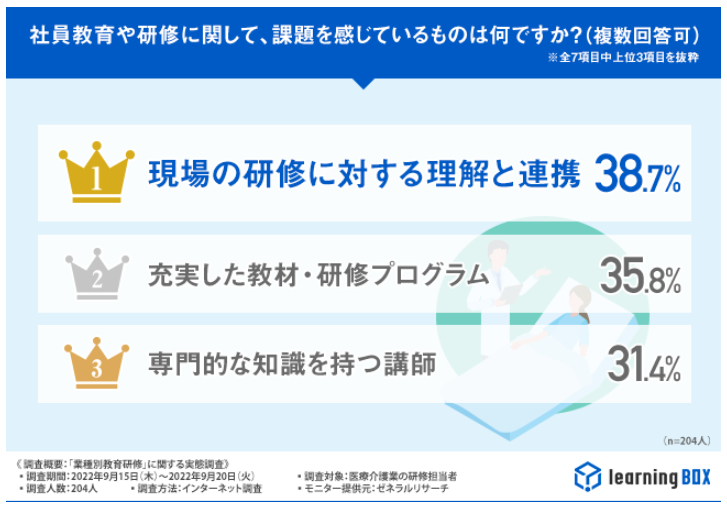LearningBOX, Inc. recently conducted a survey of training managers regarding "education and training by industry.
In this issue, we will publish the results for the medical care industry.

Survey Results Topics
The most common difficulty in creating questions for the training was "Assembling the training content.
About 40% of training managers in the medical care industry feel that "understanding and cooperation with training in the field" is a challenge.
<Survey Summary
1. survey method: web-based questionnaire using monitors from General Research Corporation
2. survey target: Training managers in the medical and long-term care industry among General Research's registered monitors
3. number of valid responses: 204
4. survey dates: September 15, 2022 (Thursday) to September 20, 2022 (Tuesday)
The most common difficulty in creating questions for training was "assembling training content.
A survey of 204 training professionals in the medical care industry was conducted.
More than 80% of the respondents answered "in-house training (82.4%)" as the training format.
Some excerpts of the content are
Medical safety (20s / Aichi)
・Infectious disease control (20s/Miyagi Prefecture)
Hospitality (30s / Osaka)
Compliance + Hospitality (40s / Chiba)
The training seems to focus on the following points.
Furthermore, about 70% (66.2%) of the respondents change the content of their training every year, and while more than 80% (86.3%) said that it should be changed every year, more than 30% (33.8%) have not been able to do so.
When asked about the difficulties in creating questions for training, the most common response was "Assembling training content (43.1%)," followed by "Devising training content (37.8%)" and "Setting a schedule within a limited training period (33.8%).
The results suggest that the medical and nursing care industry is often pressed for time to prepare for training, and that they are finding it difficult to provide high quality training in the limited time available.
About 40% of training managers in the medical care industry feel that "understanding and cooperation with training in the field" is a challenge.

As for issues they are facing regarding employee education and training, the most common response was "Understanding and cooperation with on-site training (38.7%)," followed by "Improved teaching materials and training programs (35.8%)" and "Instructors with specialized knowledge (31.4%).
In the medical care industry, where work is mainly done onsite, a lack of understanding and collaboration was found to be an issue.
Specifically.
I don't have time to prepare because I am busy with other work (20s / Ibaraki).
I couldn't grasp how much understanding I had gained (30s / Hyogo).
...Good at the time, but I can't keep track of the progress after that (30s / Fukuoka Prefecture).
The challenge is how to make them feel and put it into practice.
They feel that they are facing challenges in this regard.
Finally, we asked about specific things they do to make education and training meaningful.
Use of e-learning (30s / Miyazaki)
Training theme solicited from employees (40s/Fukuoka Prefecture)
・Regularly and irregularly check acquisition of practical skills after training (40s/Chiba)
The content of the training is designed for discussion with sufficient time for Q&A (50s / Hyogo Prefecture).
The respondents answered that they were not sure.
While it is important to cooperate with the field, the industry struggles with this because it is difficult to find the time to do so, and it was found that each company is trying to improve its training methods, content, and operation.
[Summary] The medical care industry has a sense of challenge in balancing work and training and understanding training in the field.
We found that more than 80% of education and training in the medical care industry is conducted in-house.
While more than 80% believe that the content of annual training should be changed, one in three respondents said they have not been able to change it.
The most common challenge in training was "understanding and cooperation with training in the field," indicating a sense of challenge in not being able to monitor understanding and progress.
While it is difficult to balance training with the time required for on-site work, we have learned that they are making improvements by using e-learning and other creative methods.